Editorial: ‘Dreamers’ are people, not bargaining chips

- Share via
There may have been a heartening glimmer out of the White House on Tuesday on a possible deal to protect the so-called Dreamers from deportation while moving Congress toward comprehensive immigration reform. But the glimmer could also have been a magician’s trick. The devil, as they say, will be in the details — and unfortunately, these are many of the same details that have bitterly divided pro- and anti-immigration forces for so long and derailed prior efforts to address one of the country’s thorniest issues.
Here’s something you won’t read every day in this space: We wish President Trump success here. Well, mostly. His proposed border wall with Mexico remains a silly, expensive, counterproductive and insulting idea, and maybe he’ll respond to reason during these discussions and scale back those ambitions. But to the extent that he wants to make accommodations for the Dreamers, undocumented residents who grew up in the U.S. after being brought here as children, we’re in full agreement. Trump said that was his goal at a White House meeting Tuesday with Republican and Democratic congressional leaders.
The sticking point is what the cost of compromise might be be. Trump has said he must have his wall if the Dreamers are to get a reprieve. Using the lives of some 700,000 people as political leverage is cold-hearted, and we strongly wish Congress and the president would work on a stand-alone bill that would address the imminent crisis facing the Dreamers. (Under current rules, several thousand have already lost their status, but the vast majority will lose it beginning in early March.) We note too that the crisis is of the president’s own making. He decided in September to end the Deferred Action for Childhood Arrivals program, under which the Dreamers were receiving protection.
Using the lives of some 700,000 people as political leverage is cold-hearted.
But let’s look forward. The deal parameters floated in the meeting Tuesday would resolve Dreamers’ status as a first step but would also include separate legislation beefing up border security, ending “chain migration” (in which people who have received legal status can sponsor members of their extended family for residency) and killing the diversity visa lottery program. Those are significant issues that, if passed, would upend decades of U.S. immigration policy. And there are wide gulfs between Democrats and Republicans on them. Although Trump mentioned the possibility of what he called comprehensive immigration reform, it was unclear whether he was talking about something that included a path to legalization or citizenship for the estimated 11 million immigrants living in the country illegally.
A nation has the right to secure its borders and to determine who gets to visit, work and become a citizen. Even though illegal border crossings into the U.S. have been dropping in recent years, there are still plenty of people entering without permission, and the border with Mexico remains a transit point for contraband — mostly drugs in and guns out — that needs to be tightened. Extending or reinforcing existing walls and fences might help in some locations, but a “big beautiful wall” along the entire border (for which Trump has now requested $18 billion) is not the answer. Increased electronic surveillance and other approaches, such as remote video systems and drones, would work better, security experts say.
The president has said he wants to replace the current family-based approach to immigration with a merit-based system. That would be a profound change, and it ought to be discussed in depth and not added on as a pot sweetener for a rushed deal. And Trump should think harder about the diversity visa lottery, which does not work the way the president says it does. He has complained that foreign countries “give us their worst people,” and “put them in a bin” to have their names drawn for an entry visa. No. People with the requisite work or educational background in other countries apply to U.S. consulates for the lottery and, if drawn, go through the usual vetting process for any immigrant. The intent is to benefit the U.S. by helping expand the pool of cultures and countries from which our immigrants are drawn, and it helps counter the bias toward family members under the family-based system Trump wants to end.
And this gets at the core problem with the glimmer of hope from that White House meeting. These are tricky policy issues that will take time to work through. Thanks to Trump, the Dreamers don’t have the luxury of time. Comprehensive immigration reform is way past overdue, but no one wants to settle for rushed reforms that cause their own cascading series of unforeseen consequences. Fixing DACA is the easy part. Congress and Trump should do that now without preconditions, and then turn to solving the tough issue.
Follow the Opinion section on Twitter @latimesopinion or Facebook
More to Read
A cure for the common opinion
Get thought-provoking perspectives with our weekly newsletter.
You may occasionally receive promotional content from the Los Angeles Times.









